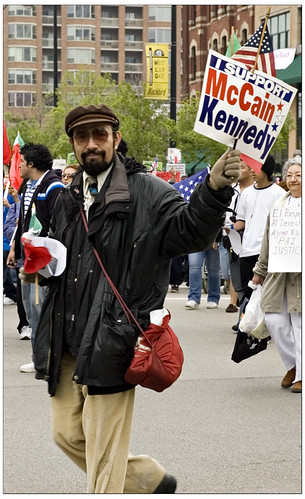
Hey, if McCain qualifies, then so do I. Of course, the US electorate would have to become a lot less prudish for me to be elected, but that's a different issue altogether.
Mr. McCain’s likely nomination as the Republican candidate for president and the happenstance of his birth in the Panama Canal Zone in 1936 are reviving a musty debate that has surfaced periodically since the founders first set quill to parchment and declared that only a “natural-born citizen” can hold the nation’s highest office.
Almost since those words were written in 1787 with scant explanation, their precise meaning has been the stuff of confusion, law school review articles, whisper campaigns and civics class debates over whether only those delivered on American soil can be truly natural born. To date, no American to take the presidential oath has had an official birthplace outside the 50 states.
[From McCain’s Canal Zone Birth Prompts Queries About Whether That Rules Him Out - New York Times]
Of course, my parents were in the anti-military, which is why I was born in Canada. I've always been an American citizen though.
Mr. McCain’s situation is different from those of the current governors of California and Michigan, Arnold Schwarzenegger and Jennifer M. Granholm, who were born in other countries and were first citizens of those nations, rendering them naturalized Americans ineligible under current interpretations. The conflict that could conceivably ensnare Mr. McCain goes more to the interpretation of “natural born” when weighed against intent and decades of immigration law.
Mr. McCain is not the first person to find himself in these circumstances. The last Arizona Republican to be a presidential nominee, Barry Goldwater, faced the issue. He was born in the Arizona territory in 1909, three years before it became a state. But Goldwater did not win, and the view at the time was that since he was born in a continental territory that later became a state, he probably met the standard.
It also surfaced in the 1968 candidacy of George Romney, who was born in Mexico, but again was not tested. The former Connecticut politician Lowell P. Weicker Jr., born in Paris, sought a legal analysis when considering the presidency, an aide said, and was assured he was eligible. Franklin D. Roosevelt Jr. was once viewed as a potential successor to his father, but was seen by some as ineligible since he had been born on Campobello Island in Canada. The 21st president, Chester A. Arthur, whose birthplace is Vermont, was rumored to have actually been born in Canada, prompting some to question his eligibility.
Quickly recognizing confusion over the evolving nature of citizenship, the First Congress in 1790 passed a measure that did define children of citizens “born beyond the sea, or out of the limits of the United States to be natural born.” But that law is still seen as potentially unconstitutional and was overtaken by subsequent legislation that omitted the “natural-born” phrase.

McCain is in Round Rock today speaking at Dell headquarters.
Hearing that makes me not want to go home this evening...